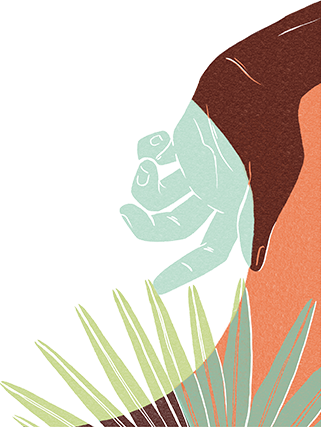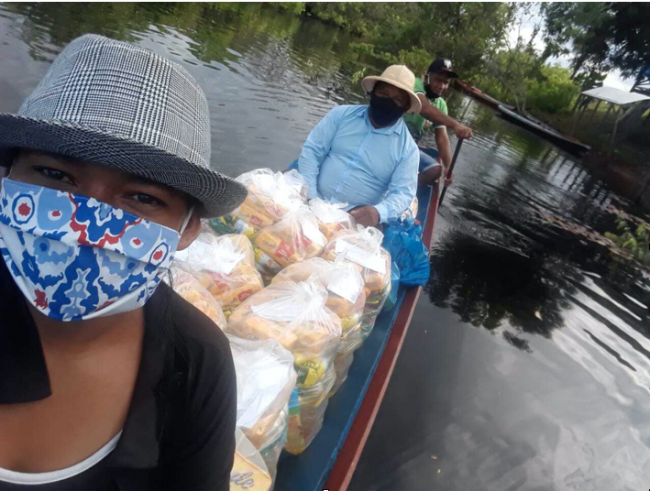 04.08.2020
04.08.2020
Donation and empathy in emergency situations
By Cristina Orpheo, Executive Director – Casa Socio-Environmental Fund
Compared to anything in the last few decades, this is an unprecedented emergency. Our human arrogance, the pretense of knowing it all, is directly linked to an erroneous socioeconomic model. Our society was literally trapped and pushed against the wall by a virus. All of a sudden, unexpected to many people, the world found itself surrounded by a life-threatening menace. Unfortunately, in situations of calamity, vulnerable people are always the most affected. The same people who always had their rights violated, who had never shared the benefits available to the privileged layers of society.
The pandemic has left our inequality gap wide open, showing how far we are from equality and social justice, and undoubtedly exposing the large number of people who are invisible to public policies and even from our society. It would be hypocritical to say society was caught by surprise, as the living conditions of these populations most affected by Covid-19 have always been of total exclusion, abandonment and neglect by authorities. As if the pandemic was not enough, the risk of hunger has exponentially increased for them. The precarious state of the public health system, and even the lack of drinking water in large areas of the country, triggered an alert calling upon us to act in favor of life.
At this moment, one of the great challenges is to ensure that funds will safely and quickly reach the most vulnerable communities and groups. It is also indispensable to discuss the types of funding and what amount actually reaches the localities to benefit communities directly. We also need to ask what are the conditions and restrictions imposed on these funds and if they help or block access by the neediest people.
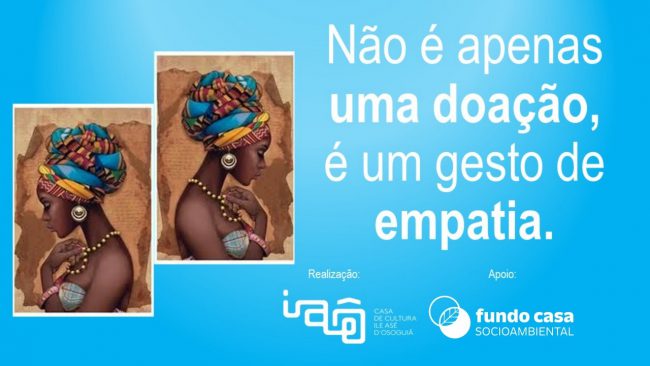
“It’s not just a donation, it’s a gesture of empathy” – Ilê Asé D’Osoguiã Cultural Center, João Pessoa, Paraíba state, received a grant from the CASA Fund Covid-19 Emergency Fund.
How can we ensure that money from philanthropy or different donations will rapidly make a difference in this complex context in which everything is compromised – logistics, communication, access to groups, and mobilization in the territories? What are the requirements, information checking, and other necessary operational procedures in such an adverse scenario?
In this situation, knowing the territories, having a network of trust established, and understanding the different cultural contexts, are key factors to make sure funds will arrive rapidly enough to save lives – in a very concrete sense.
In addition, another feeling must enter our reason: empathy. To understand the importance of humanitarian help in this situation and display the necessary flexibility is a challenge to be faced with courage, especially by those in the more conventional philanthropic organizations that are more resistant to flexibility.
The Casa Fund has encompassed all these senses when it launched its Call for Projects to Support Grassroots Groups Facing Covid-19. First, the flexibility of this type of support – normally we do not provide humanitarian support, but in this case we were in a great strategic position to access the territories, and could not shirk our responsibility because of bureaucratic obstacles. We also had the support from a huge network of trust that led us to understand the context of the real needs and the most efficient way of meeting them. Finally, we cannot forget the creativity that characterizes our approach to field work, finding solutions through empathetic attitudes.
After a rapid process of consultations with community groups in our network, and with partner funds, followed by a broad discussion in our Governance Board– well aware of the urgency faced by communities – we launched an emergency call for projects focused on the Northern Region (Legal Amazon) and the Northeast.
Initially, we decided to prioritize those regions for two reasons: our funds were limited ant the access to funding by groups in those regions demanded very special and complex logistics that few organizations were able to deliver.
Our objective was to carry out the whole process of the call for projects, including analysis, approval, and fund release in 30 days. The call for projects remained open for 15 days, with the following lines of support:
- Projects and actions to reduce the socioeconomic impact generated by the Covid-19 pandemic – Proposals up to R$ 25,000.
- Grants to combat, detect, and prevent the Covid-19 pandemic – Proposals up to R$ 20,000.
- Support to ensure basic and emergency rights – Proposals up to R$ 5,000.
We received a total of 526 projects from all states contemplated in the call for projects. Out of this total, 56 requests were for line 3 and 470 for lines 1 and 2.
| States | Total projects received |
| Northern Region – Legal Amazon | |
| Acre | 5 |
| Amazonas | 34 |
| Amapá | 8 |
| Mato Grosso | 18 |
| Maranhão | 44 |
| Pará | 100 |
| Rondônia | 23 |
| Roraima | 16 |
| Tocantins | 14 |
| Total – North | 262 |
| Northeastern Region | |
| Alagoas | 25 |
| Bahia | 94 |
| Ceará | 41 |
| Paraíba | 12 |
| Pernambuco | 40 |
| Rio Grande do Norte | 17 |
| Sergipe | 13 |
| Piauí | 22 |
| Total – Northeast | 264 |
| Grand total | 526 |
It was hard to make this selection, but taking into account available funds, we managed to approve 129 projects, 69 in the Northern Region (Legal Amazon) and 60 in the Northeast, totaling R$ 2,148,841.13.
In this selection we used the following criteria:
- Degree of vulnerability of the community in the face of the Covid-19 impacts. We focused on the most vulnerable populations: Indigenous peoples living near cities, in areas still not demarcated and regions with conflicts. We also prioritized Quilombola communities facing great vulnerability.
- Covid-19 rates in the state/region – Consulting official data, monitoring case evolution, checking media information, and also information from our own network of supported groups. We should remember that if a certain region is expected to be the next infection hotspot, preventive measures are as important as mitigating actions; and the lack of structure to deal with the pandemic in a region should also be taken into account. In these analyses, we consulted official websites and civil society observatories.
- Level of tensions and violence in the territory – Taking into account if people in the organization were involved in conflicts, if the territory near the community and where the project would be implemented was affected by tensions or conflicts, and how Covid-19 impacted this scenario.
| Typology of organizations | |
| Indigenous | 28 |
| Quilombolas | 20 |
| Fishing | 14 |
| Extractivists | 20 |
| Farmers | 11 |
| Associations/NGOs | 29 |
| Collectives/Movements | 7 |
| Total | 129 |
Fifteen people participated in receiving the proposals, inserting them into the database, analyzing, formalizing contracts, and making the payments. The entire process required ten meetings of the team.
We also supported four other spontaneous emergency requests, thus totaling 132 projects and R$ 2,232,329 in direct grants to civil society.
Sources of funds – Part of these funds came from reallocations in our own current budget. However, the bulk of the funding came from our valuable partners – six international foundations: Oak Foundation, Charles Stewart Mott Foundation, Amazon Watch, Rainforest Action Network, Climate And Land Use Alliance, and Fondation de Luxembourg. And also two Brazilian organizations: Instituto Humanize e Fundo Socioambiental Caixa.
Next steps – We know this impact will remain in the life of communities for a long time. There is a lack of public policies to recover and adjust affected areas, systems were discontinued, and socioeconomic damages occurred. It will be necessary to continue supporting groups in their resilience and invest in solutions. Small and medium sized civil society organizations working in the territories will play a fundamental role in this process and they need to be strengthened. In the short term, in the next few months, our goal is to grant an additional amount of R$ 2 million to organizations focusing on food sovereignty, and strengthening small and medium sized organizations.
Furthermore, the Casa Fund is preparing a set of calls for projects in the medium term (2020-2021), addressing different issues of socio-environmental justice, supporting around 280 projects and predicting a much higher demand by the end of 2021.
Thus, the Casa Fund is already preparing for this new stage, where subsistence economies, food sovereignty, and resilience will be imperatives, not only for remote and isolated communities, but also for all humankind.
Below we add some accounts sent by groups after they received the grants:
Association for the Urupanã Community Environmental Preservation – APACU (Terra Santa – Pará)
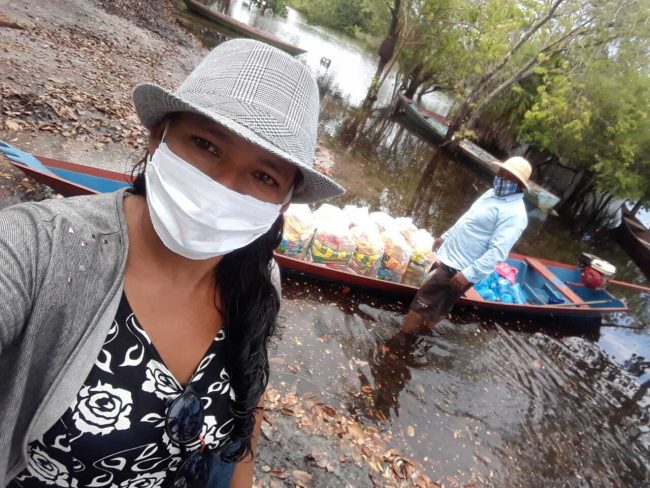
Jocinara Siqueira, Francisco Neto, and Edno Lopes transporting by canoe basic food baskets to the Urupanã community.
The reaction of families who received the food baskets was hard to describe, a mixture of joy, surprise, and relief. As this was an action initiated by the community association to help Urupanã families, they had to understand that the association had managed to get a collective project approved by an “outside” institution (the Casa Fund). It was very satisfying for us at the association board because it strengthened us internally. Our members observed and appreciated the association even more, noticing that we were not paralyzed by the situation and are seeking alternatives to minimize problems and protect all of us from the pandemic.
Association of Agro-Extractivist Producers of Ituxi River Assembly of God – APADRIT (Lábrea – Amazonas)
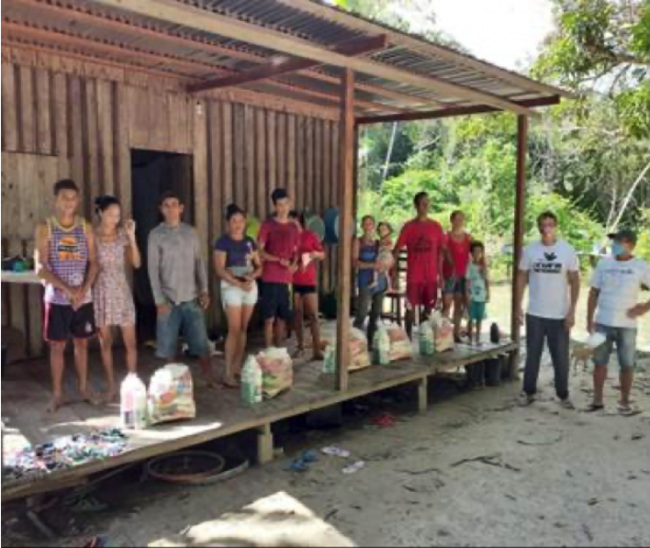
Receiving basic food baskets in the Ituxi Extractive Reserve.
The association has the capacity to rapidly put together partnerships through campaigns on social media. APADRIT is recognized as a well-connected association in Lábrea and outskirts, and people were sensitized by our cause and the emergency. Members understood the importance of having an association to represent them. “For APADRIT, the action in the Ituxí Extractive Reserve against Covid-19 was very gratifying, as several people were isolated along streams afraid of the pandemic; we found families without any food purchased in markets. They are very grateful for this support from partners” – Silvério Barros Maciel, president of APADRIT.
Residents Association of Tapera and Miringaba (Caravelas – Bahia)
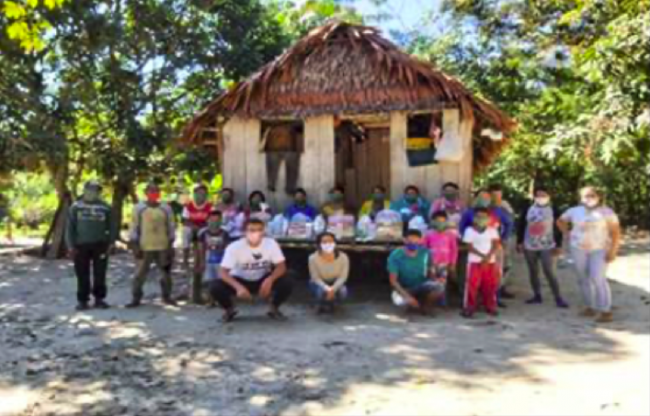
Fishing community of Tapera and Miringaba receiving basic food baskets.
The project helped to strengthen the social organization of our members, as we currently face many difficulties to organize meetings. It also helped families to access food and hygiene products. In our present situation, people in our territory who live off shellfish are facing huge obstacles to ship and market their production. Also, the purchases in the local market and small shops have helped the hard hit local business. Thus, the project came in a difficult moment and helped to strengthen the territory with its small actions.
